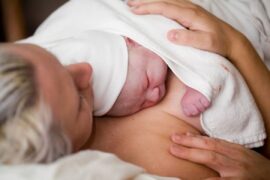By Dr. Dawn Kingston
When I talk to new mums about their emotional health while they were pregnant, I listen while they share what it was like, the sadness or worry that they felt and how it affected their experience of pregnancy – and their lives.
Then they get quiet… and they look down… and I see the pain and angst on their face as they choke out the words…
“Have I harmed my baby?”
Calming the Most Deep-Seated Fear
Without question, this is The Most Deep-Seated Fear.
At its core, The Most Deep-Seated Fear is an experience of intense shame that you’ve caused irreversible harm to your baby. It’s the fear that can’t be verbalized. It’s the one that you can barely bring yourself to think about.
I want to calm that fear – with hope.
The Sharp Study: A Message of Hope
Recently, I found some research that offered the first semblance of hope for new mothers around the question: If I struggled with depression or anxiety while I was pregnant, what can I do about it now?
The Sharp Study followed a group of almost 300 pregnant women who lived in the UK, most of whom had experienced depression during their pregnancy. Researchers asked these women questions about their mental health twice during pregnancy (20 weeks and 32 weeks) and three times after they had their baby (at 5 weeks, 2 months, and 7 months). After they’d had their babies, women were also asked how often they held and stroked them during the first 2 months of their babies’ life.
Here is the “hope” part.
Simply holding and stroking the babies “nullified” the effects of prenatal depression. In particular, the infants of the mothers who held and stroked their babies more (4 or more times every day) showed better emotional and physical health than infants who were not stroked and held as much by their mothers (3 or fewer times every day). Infants who had been held and stroked more frequently were less reactive, less fearful and more on track with their behavioural development.
Beat perfectionism during pregnancy here.
More Reason for Hope
When the children were 2-1/2 years old, the Sharp group checked in with the study mothers again, and they found even more reason for hope.
One of the child development challenges that has been linked to prenatal anxiety and depression is “internalizing behaviour”. When a child shows internalizing behaviours, he tends to be withdrawn, sad, and sometimes anxious. Researchers found:
- Children whose mothers had prenatal depression, but who also held and stroked them a lot (4 or more times per day) within the first two months of their young lives didn’t show internalizing behaviour.
- Children whose mothers with prenatal depression stroked or held them less (3 times or less per day) did show internalizing behaviour. That is, the children tended to show more sadness, social withdrawal, fearfulness, and anxiety.
At 3-1/2 years of age, researchers found the same results for prenatal anxietyas for depression. In other words, children of mothers who had prenatal anxiety but in the first two months held and stroked their babies more were less likely to have internalizing behaviours or externalizing behaviours (e.g., aggressive, angry).
I call this a good news story – that there is something that new mothers can do to reduce the potential risk of developmental challenges that their infants may experience if they’ve been exposed to depression or anxiety during pregnancy.











